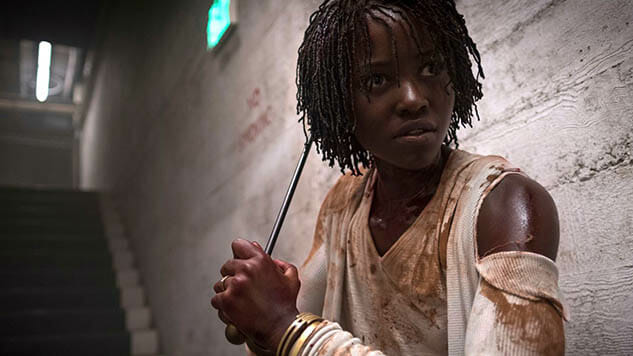Us

Us clarifies what Get Out implies. Even after only two films, Jordan Peele’s filmmaking seems preconfigured for precision, the Hitchcock comparisons just sitting there, waiting to be shoved between commas, while Peele openly speaks and acts in allusions. Us, like Get Out before it but moreso, wastes nothing: time, film stock, the equally precise capabilities of his actors and crew, real estate in the frame, chance for a gag. If his films are the sum of their influences, that means he’s a smart filmmaker with a lot of ideas, someone who knows how to hone down those ideas into stories that never bloat, though he’s unafraid to confound his audience with exposition or take easy shots—like the film’s final twist—that swell and grow in the mind with meaning the longer one tries to insist, if one were inclined to do so, that what Peele’s doing is easy at all.
A family comedy studded with dread, then a home invasion thriller, then a head-on sci-fi horror flick, Us quickly acquaints us with the Wilson family: calming matriarch Adelaide (Lupita Nyong’o), gregarious dad Gabe (Winston Duke), daughter wise beyond her years Zora (Shahadi Wright Joseph) and adorable epitome of the innocent younger brother, Jason (Evan Alex). Though far from shallow, the characters take on archetypal signifiers, whether it’s Zora’s penchant for running or that Gabe’s a big guy whose bulk betrays a softer heart, Peele never spoonfeeding cheap characterizations but just getting us on his wavelength with maximum efficiency. We like this family, and they seem to like each other, especially in contrast to family friends Josh (Tim Heidecker) and Kitty (Elisabeth Moss), who proudly represent their brand: being affluent, obnoxious white people. Us isn’t explicitly about race, but it is about humanity’s inherent knack for Othering, for boxing people into narrow perspectives and then holding them responsible for everyone vaguely falling within a Venn diagram. Kitty jokes about killing Josh; there is no punchline. We get it, Josh sucks.
Both families gather at their respective summer homes, drinking by the beach in Santa Cruz while Adelaide grows increasingly paranoid that something bad lurks, has been lurking forever, just outside of her consciousness. Dramatic irony: We know that Adelaide still thinks of a traumatic experience she had as a child, in 1986, because we saw it at the beginning of the film. Peele serves up a cold open in which a young Adelaide, at the very same beach, wanders away from her dad and into a haunted house, where she comes face to face with a sight that breaks her brain. Which probably has something to do with the family, dressed all in red and brandishing scissors the size of novelty ceremonial ribbon cutters, who show up (at 11:11 pm) to take over the Wilsons’ home and, when not grunting or whinnying, speak in strangled ghost-cadence. Also: They look just like the Wilsons, but twisted, as if they’re made of darker stuff. Nightmares come wailing into the light, stronger and faster and so much more brutal than their normie counterparts.
-

-

-

-

-

-

-

-

-

-

-

-

-

-

-

-

-

-

-

-

-

-

-

-

-

-

-

-

-

-

-

-

-

-

-

-

-

-

-

-








































